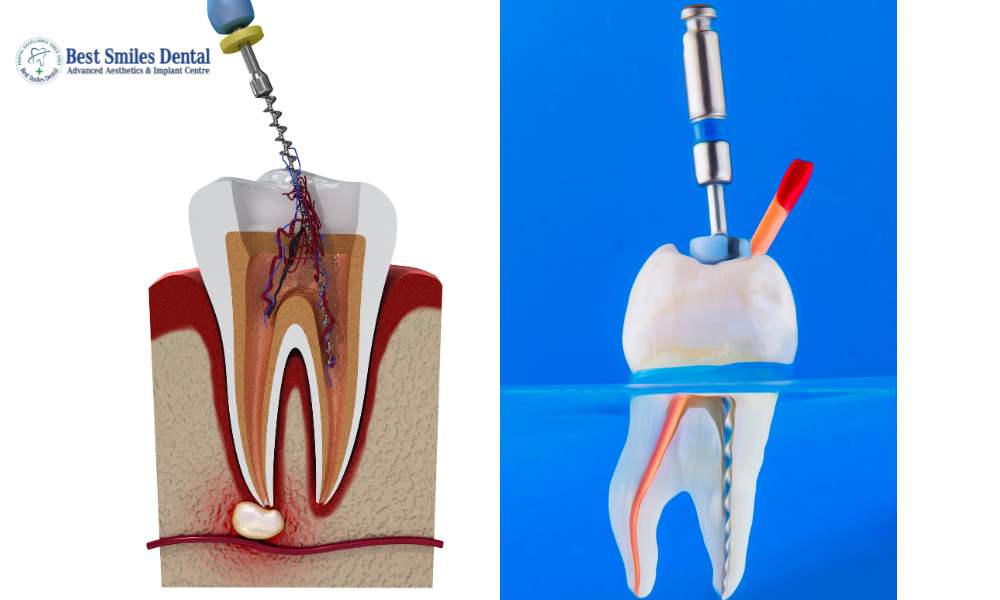Need Appointment ?
Root Canal Treatment(RCT)
A root canal (endodontic therapy) is a dental treatment for infections in tooth pulp, the innermost layer of your teeth.
Book Appointment to find out which treatment might be best for you at Best Smiles Advanced Dental Clinic.
Why would I need a root canal?
You may need a root canal if bacteria inside your mouth invade the pulp inside your tooth and cause inflammation (pulpitis). Your tooth pulp may come under bacterial attack if:
- You have a deep cavity that needs treatment.
- You have a cracked or damaged tooth, and bacteria from plaque infects your tooth pulp.

What are signs I may need a root canal?
If you have an infected tooth, you may need root canal treatment to clear out the infection. You can have infected teeth without symptoms. When you have symptoms, they may include:
- Tooth pain that doesn’t go away. Lots of things make your teeth hurt. But pain that’s deep in a tooth or that spreads to your jaw, face or other teeth may mean you have an infection.
- Pressure hurts. If your tooth hurts when you eat or touch it, it may mean something damaged the nerves around your tooth pulp.
- Swollen gums. If you have an infected tooth, your gums may swell or feel tender.
- Pimple on your gums. Infected teeth can create pimples or boils on your gums that ooze smelly pus.
- Swollen jaw. Your jaw may swell from pus that doesn’t drain away from your infected tooth.
- Discolored tooth. Tooth pulp infection keeps blood from getting to your tooth. That makes your tooth turn dark.
- Loose tooth. Pus from infected tooth pulp can soften the bones supporting your tooth, making your tooth feel loose.
What are the benefits of root canals?
- Root canals eliminate tooth infections that, left untreated, could cause serious issues like:
Infection that spreads to other teeth. - Jawbone damage.
What are the risks of root canals?
Sometimes root canals fail because they weren’t the right solution for your tooth infection. For example, if your tooth is very damaged, a root canal may not solve your issues. If your root canal fails, your healthcare provider will discuss other options:
- Re-treating your infected tooth by doing another root canal.
- Removing (extracting) your infected tooth and replacing it with a dental implant or dental bridge.
What happens during root canal treatments?
Before beginning treatment, your dentist or endodontist will take dental X-rays of the affected tooth. They may do other tests to determine if your tooth pulp is dead, infected or inflamed and confirm that you’ll need a root canal. They may:
- Gently tap on your tooth or touch it with a cold or hot substance to check for sensitivity or discomfort.
- Do an electric pulp test (EPT) by using a device that sends a gradually increasing electric current through your tooth to see if your tooth pulp reacts.
- Check for signs of swelling in the gums and bone around your tooth.
- Ask if it hurts when you bite down on your tooth.

Pain-Free Dentistry
Comfortable, stress-free treatments every time.

Next-Gen Equipments
Precision care with advanced technology.

Expert Care Guaranteed
Trusted specialists for superior oral health.
Frequently Asked Questions
Discover everything you need to know about professional tooth cleaning and polishing. Learn how it removes plaque, enhances your smile, and promotes better oral health.
Common signs that you may need a root canal include persistent tooth pain, sensitivity to hot or cold foods, swelling or tenderness in the gums near the affected tooth, and discoloration of the tooth. Your dentist will perform an examination and take x-rays to confirm the need for the procedure.
In most cases, preserving your natural tooth with a root canal is preferable to extraction. A root canal allows you to keep your natural tooth structure, which helps maintain proper chewing function and alignment of your teeth. Tooth extraction may require a replacement like a dental implant or bridge, which can be more invasive and costly.
Putting off root canal treatment increases the chance that:
- You’ll lose your infected tooth.
- The infection in your tooth pulp will spread to other teeth.
- The infection will spread to your jawbone.
Practicing good oral hygiene and having regular dental checkups are the best ways to avoid root canal treatment.
Root canal treatment can be uncomfortable, mostly when your provider injects anesthesia into your gums and other parts of your mouth. Your provider wants you to be relaxed during treatment, so never hesitate to let them know if something hurts.

